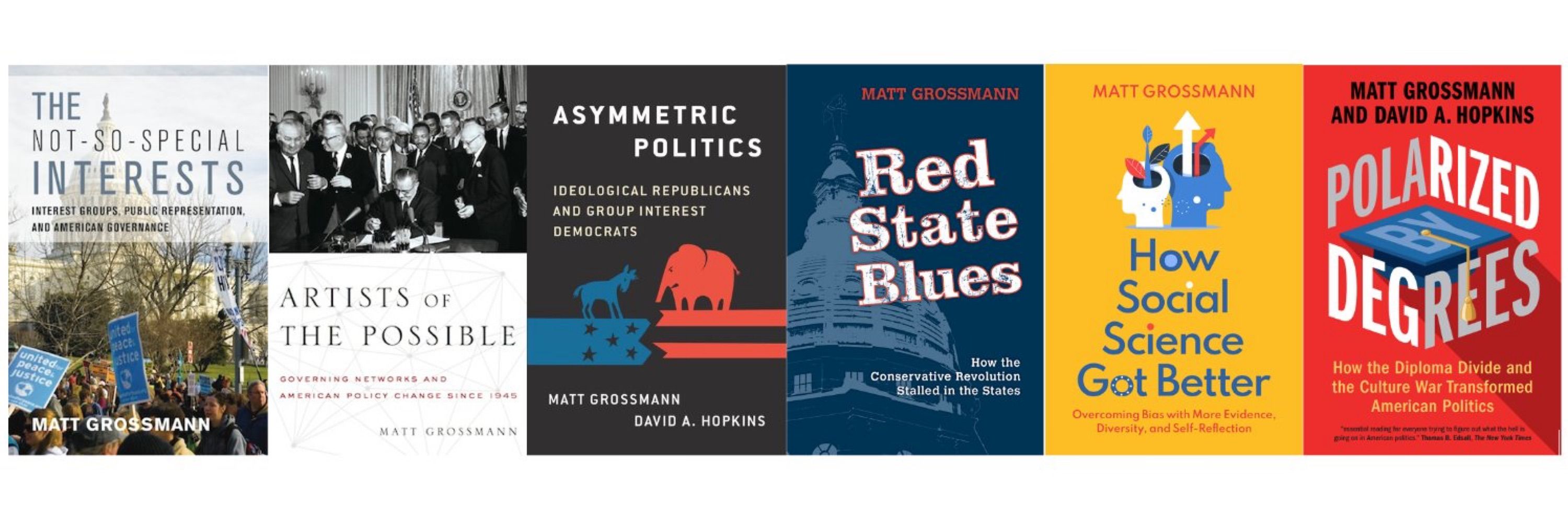
Matt Grossmann
@mattgrossmann.bsky.social
Michigan State political scientist & IPPSR Director; Hooked bookstore/cafe Co-owner; Science of Politics Podcast; New book: Polarized by Degrees
The shutdown didn't achieve anything. We were not particularly close to ending the filibuster or funding ACA subsidies, just a longer shutdown. But instigating parties don't usually learn from failure because the argument is always that you could have fought harder & longer.
November 10, 2025 at 3:56 AM
The shutdown didn't achieve anything. We were not particularly close to ending the filibuster or funding ACA subsidies, just a longer shutdown. But instigating parties don't usually learn from failure because the argument is always that you could have fought harder & longer.
Exit polls & initial voter data agree that differential partisan turnout is a, but not the main, factor driving VA & NJ results:
www.nytimes.com/2025/11/06/u...
I would instead infer that (1) is overstated. It doesn't take many swing voters to shift aggregate outcomes when they move the same way (2)
www.nytimes.com/2025/11/06/u...
I would instead infer that (1) is overstated. It doesn't take many swing voters to shift aggregate outcomes when they move the same way (2)

Democrats Won Big Because They Won Over Trump Supporters
www.nytimes.com
November 6, 2025 at 2:19 PM
Exit polls & initial voter data agree that differential partisan turnout is a, but not the main, factor driving VA & NJ results:
www.nytimes.com/2025/11/06/u...
I would instead infer that (1) is overstated. It doesn't take many swing voters to shift aggregate outcomes when they move the same way (2)
www.nytimes.com/2025/11/06/u...
I would instead infer that (1) is overstated. It doesn't take many swing voters to shift aggregate outcomes when they move the same way (2)
As usual, the 2025 elections featured both a partisan turnout advantage & swing voters (including Hispanics) moving against the party of the president. Initial evidence from VA & NJ show most change came from swing voting (as is normal):
www.nytimes.com/2025/11/06/u...
www.nytimes.com/2025/11/06/u...

Democrats Won Big Because They Won Over Trump Supporters
www.nytimes.com
November 6, 2025 at 2:07 PM
As usual, the 2025 elections featured both a partisan turnout advantage & swing voters (including Hispanics) moving against the party of the president. Initial evidence from VA & NJ show most change came from swing voting (as is normal):
www.nytimes.com/2025/11/06/u...
www.nytimes.com/2025/11/06/u...
Reposted by Matt Grossmann
But that's just variance. Everyone wants to know about average bias. Here it is. Polls in the last two weeks of the campaign overstated Democratic margins by 2.7 points across all offices—smaller than the 4.6-point overestimate in 2020 and 3.1 points in 2016. But that's a Dem bias 3 cycles in a row.

October 29, 2025 at 8:24 PM
But that's just variance. Everyone wants to know about average bias. Here it is. Polls in the last two weeks of the campaign overstated Democratic margins by 2.7 points across all offices—smaller than the 4.6-point overestimate in 2020 and 3.1 points in 2016. But that's a Dem bias 3 cycles in a row.
Their saving grace is that the Republicans have also massively overshot the public in positions & actions & in some cases are also negatively influencing objective conditions they will run on. In midterm, out-party positioning may not matter much. But long-term problem remains
October 29, 2025 at 5:06 PM
Their saving grace is that the Republicans have also massively overshot the public in positions & actions & in some cases are also negatively influencing objective conditions they will run on. In midterm, out-party positioning may not matter much. But long-term problem remains
But the party has moved leftward faster & further than the public while cultural issues have become more central, changing its brand, coalition, & relative standing. The more 1&2 are true, the bigger the party's predicament--not the less it matters.
October 29, 2025 at 5:06 PM
But the party has moved leftward faster & further than the public while cultural issues have become more central, changing its brand, coalition, & relative standing. The more 1&2 are true, the bigger the party's predicament--not the less it matters.


